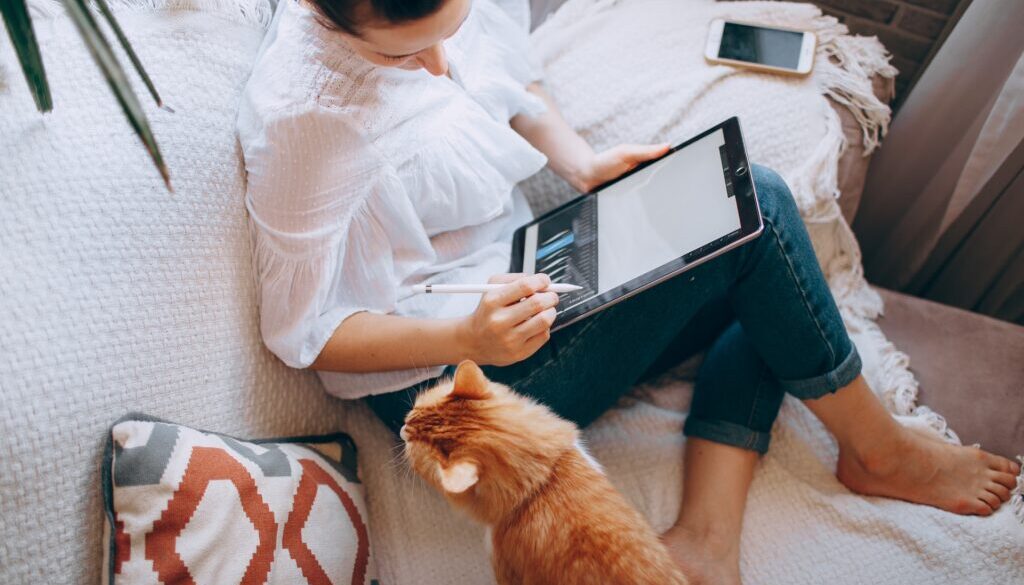Why You Feel Guilty About Working at Home and What To Do About It
It’s a typical workday in 2023—you put in a few hours of work from your home office before popping out for a walk and grocery run during your midday break.
In the afternoon you head over to your local coffee shop and finish working on a project before heading home to prepare dinner. All is well… so why do you feel guilty?
Flexible work guilt—or the worry and concern that comes with taking advantage of your new-found autonomous workstyle—is a new phenomenon plaguing many professionals.
In fact, many workers with flexible schedules end up putting in more time than their fixed-schedule counterparts because they feel obliged to justify the legitimacy of working from home or on their own time.
So let’s explore this idea, why it’s happening, and what you can do about it.
More Guilt, More Work

Autonomy, freedom over your schedule, and less in-person accountability leads many professionals to feel some sense of guilt.
But this is because we have a deeply-rooted cultural value that long hours equate to dedication and productivity. The more time you put in, the better of a worker you are.
Going against this trend, then, lends to guilt or worry that you’ll be seen as lazy or unproductive.
Further, remote work blurs the lines between work life and home life, making it harder to “shut off” at the end of the day.
Remote and flexible workers can work at all times of the day and many feel like they should, and therefore, they do so. This is why you need separation between working and living space as a flexible worker.
And all of this may lead to overcompensating with more work:
- A 2016 study found that women with a flexible work schedule worked four hours more on average than their fixed-schedule counterparts.
- A 2021 study found that 55% of remote workers say they work more hours remotely than at the office.
Both of these figures are because of internal reasons, not because their workloads have changed. The newfound autonomy and freedom many professionals are experiencing is a mindset shift that’s hard to get used to.
A New Way of Work

Despite potentially working more hours than before, 87% of workers chose at least some remote work in their schedule when given the opportunity.
And it’s easy to understand why. Remote work has a number of benefits for professionals of all stripes:
- Reduced or no commute
- Increased flexibility and more personal time to attend to personal responsibilities or hobbies
- More autonomy over work tasks and schedule
- Opportunity to work at any time or place, which can align with peak productivity periods
- Fewer distractions and “time-wasters” in the office
This isn’t to say there are no downsides to remote or flexible work. Many professionals struggle with feelings of isolation and have a harder time communicating with colleagues.
That said, the benefits of a flexible schedule typically outweigh the disadvantages, especially when you have the option to change your location or hours.
But these benefits of flexible work cannot be realized if professionals continually carry a sense of guilt.
The idea that time in the office equates to success is outdated.
Instead, we need to embrace a new way of working, where outcomes matter more than facetime, and flexibility is seen as a virtue in the workplace.
6 Ways to Stop Flexible Work Guilt
1. Clarify Expectations

The first step is to clarify expectations with your employer or manager. You need to be clear on what is required from you in your position so that you don’t actually need to feel guilty about something!
Here are some things to think about:
- Are there specific hours of the day you need to be online?
- Do you need to work from a specific location for security or privacy reasons?
- What are expectations for communication during the work day and post-work hours?
With this as a starting point, you can then organize your own work schedule in the way that best suits you with no fear of doing something that’s not permitted.
Self-employed professionals can also check in on their own expectations—what does an ideal schedule look like? What are you “allowed” and “not allowed” to do?
2. Set Boundaries

With the expectations of your role in mind, it’s time to set boundaries.
For example, you’ve clarified that there is no obligation to respond to Slack messages except between the hours of 1:00-4:00 p.m., then you can set a boundary by not actually responding to those messages!
Protect your time and schedule with practical boundaries:
- Blocking time in your schedule for specific tasks
- Setting an out-of-office reply
- Turning notifications to “do not disturb”
- Telling your team when your working hours are
- Removing your work email from your personal phone
Remember, boundaries are only effective when you keep them. So think in advance about how you will respond to someone or something that tries to step over your boundaries so you know how to respond.
3. Connect With People

Many professionals are accustomed to working around other people which naturally brings some accountability. It also inspires productivity when you’re in the same environment as other like-minded workers.
So if you’re struggling with isolation and notice how it impacts both your motivation and flexible work guilt, make it a priority to connect with others. You can try one of these options:
- Utilize bookable meeting rooms to foster in-person collaboration
- Use your lunch breaks to connect with someone, either in-person or over the phone
- Ensure you have social activities planned after work when you spend the workday to yourself
- Pick up a group hobby or exercise class
- Join a coworking space to be around other hard-working professionals
We know that socializing helps your work performance, so make sure to connect intentionally with other people in your day-to-day routine.
4. Ask For Help

If you’re struggling with flexible work guilt and find yourself working long hours, check in with someone and ask for help.
Open communication with your employer or colleagues may help you better understand your workload and responsibilities. Maybe some things need to be shifted to other people or there needs to be clarity on what the team expectations are.
If the feelings of guilt or worry are extreme, you may consider seeking professional help as well. Talking with a counselor or life coach can help you identify priorities and work towards a greater work-life balance.
5. Focus on Outcomes

Another mindset shift to mitigate flexible work guilt is to focus on outcomes. We can’t keep using outdated metrics of success as hybrid and flexible schedules become the norm.
Success isn’t based on in-office facetime. Instead, it’s about achieving goals and outcomes.
So, check in on your performance:
- Are you accomplishing your projects and tasks?
- Are you working efficiently and productively?
- Are you creating and innovating new ideas?
- Are you meeting your targets and small business KPIs?
If the answer is “yes,” then it doesn’t really matter how, where, or when you’re accomplishing it—it just matters that you are.
6. Practice Self-Care

The final way to combat flexible work guilt is in line with any advice regarding mental health and well-being: practice self-care. There are many ways to do this, but here are some places to start:
- Prioritize physical health through healthy eating and exercise
- Manage your stress through yoga, deep breathing, journaling, or a gratitude practice
- Invest in your hobbies and interests
- Connect regularly with loved ones
- Ensure a good night’s sleep by establishing a good nighttime and morning routine
Flexible work guilt may be a common experience for professionals today, but it’s a misplaced one. We need to start switching our views of success and productivity to thrive in the new flexible work environment—these six tips will set you on the path to get there.
If you’re a small business owner or independent professional and you want to get more out of every workday, book a tour of Co-Balt today.



